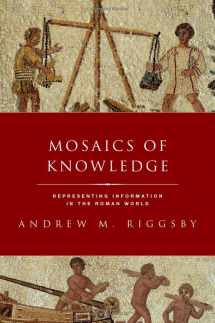
Mosaics of Knowledge: Representing Information in the Roman World (Classical Culture and Society)
Book details
Summary
Description
Today's information technology often seems to take on a life of its own, spreading into every part of our lives. In the Roman world things were different. Technologies were limited to small, scattered social groups.
By examining five technologies-lists, tables, weights and measures, artistic perspective, and mapping-Mosaics of Knowledge demonstrates how the Romans broke up a world we might have imagined them to unite. That is, the recording, storage, and recall of information in physical media might be expected to bind together persons distant in time and space. More often than not, however, Roman instances serve to create or reinforce the isolation of particular groups. Persons in different "locations"- whether those are geographical, social, or occupational-had access to quite different informational resources, and the overall situation is thus not controlled by the needs of any particular class or group. On the one hand, these constraints on use in turn constrain the development and power of individual technologies. Development is slow, scattered, and far from one-directional. On the other, seeming technological weaknesses can turn out to be illusory if we set them in actual use-contexts. Romans deploy no more but also no less "computing" power than needed for very narrowly defined goals.
This study combines detailed readings of a wide variety of evidence (inscriptions, small archeological finds, artworks, literary texts) with theoretical consideration of the social, cognitive, and material contexts for their use to present a unique portrait of Roman IT capabilities, limitations, and habits.


We would LOVE it if you could help us and other readers by reviewing the book
Book review



